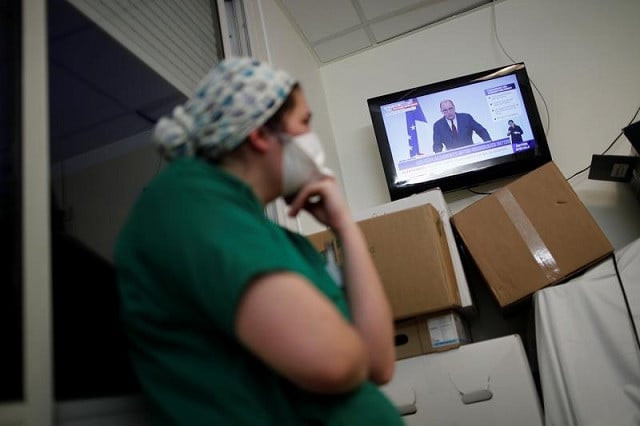French healthcare workers refuse Covid vaccine over 'possible side effects'
Only 64% of hospital personnel have been vaccinated in the country

Pressure is mounting on French authorities to make Covid-19 vaccine compulsory for healthcare workers amid fears of fourth coronavirus wave triggered by the highly transmissible Delta variant.
Many French healthcare workers are refusing to get the Covid-19 vaccine over concerns about its possible side-effects, reported France 24.
Prominent doctors of the country have called on the government to pass a law forcing nursing home and hospital employees “exposed to, or exposing those in their care to the risk of infection” with Covid-19 to be vaccinated.
Covid vaccinations could become compulsory for health workers if they do not drop their resistance to getting the jab, France's health minister had warned earlier.
So far, only 57% of caregivers in nursing homes and 64% of hospital personnel have been vaccinated in France, according to the French Hospital Federation. With the risk of a fourth wave looming, pressure is growing for all healthcare professionals to get the jab. But many remain reluctant, sharing their concerns in anti-vaccination Facebook groups and on social media using the hashtag #JeNeMeVaccineraiPas (or #NotGettingVaccinated).
Sylvie, a retirement home nurse, has refused for fear of possible side effects. “I don’t trust their gene therapy. There’s not enough hindsight about the vaccine. It’s still experimental and humans are being used as guinea pigs. To me, it’s toxic,” she told France 24.
Martin, a psychiatric ward nurse, shares these fears. “We can’t be certain that there are no side effects in the medium and long term,” he added.
“The vaccinations should only be for those at risk, like the elderly and people with underlying health issues," he said, stressing that he was not anti-vaccine in general and was up to date with all his other shots.
Half of his colleagues shared this view, he said, and the issue has become a contentious one.
“What will happen to those who refuse even if it is required?” he asked, saying such a law could “lead to a wave of resignations”.
Anita, an assistant nurse in a gastroenterology and palliative care unit, asked herself the same questions. “I wondered how there could be a vaccine in so little time that was effective and safe,” she said.
“We had no information on what was going on regarding the disease, the vaccines, the treatments … It was totally different during the H1N1 epidemic, where there was much more information and more safety measures in place.”



















COMMENTS
Comments are moderated and generally will be posted if they are on-topic and not abusive.
For more information, please see our Comments FAQ